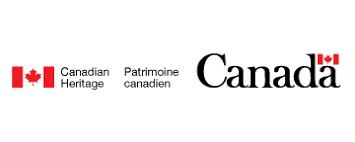RECLAIMING RECLAIMING RECLAIMING OUR VOICES OUR VOICES OUR VOICES
URBAN FORUM ON INDIGENOUS URBAN FORUM ON INDIGENOUS URBAN FORUM ON INDIGENOUS LANGUAGES LANGUAGES LANGUAGES







RECLAIMING RECLAIMING RECLAIMING OUR VOICES OUR VOICES OUR VOICES
URBAN FORUM ON INDIGENOUS URBAN FORUM ON INDIGENOUS URBAN FORUM ON INDIGENOUS LANGUAGES LANGUAGES LANGUAGES






On behalf of the National Association of Friendship Centres (NAFC), it is my pleasure to extend a warm welcome to each of you to the traditional and unceded territory of the Algonquin Nation for the NAFC’s Indigenous Languages Forum: Reclaiming Our Voices: Urban Forum on Indigenous Languages.
This gathering represents a unique opportunity to bring together Friendship Centres (FCs), Provincial and Territorial Associations (PTAs), Indigenous Organizations, Elders, Knowledge keepers, Indigenous language coordinators and experts working towards the revitalization of Indigenous languages and culture
In acknowledging the critical need to preserve and promote Indigenous languages in Canada and globally, urban Indigenous peoples must be included in these efforts toward revitalizing, reclaiming, maintaining, promoting and preserving Indigenous languages. For many of us, learning and speaking our traditional language was not an option. The work you are all doing is changing that, and I am grateful to you.
Unfortunately, I am not able to attend this important forum however as you gather together over the next 2 days, the good work being done within the Friendship Centre movement will be highlighted and celebrated as you explore best practices and promote language revitalization by fostering unity and knowledge exchange from coast to coast to coast This Forum aims to strengthen inter-regional relationships, encourage resource sharing, and amplify the collective impact of Indigenous language revitalization by the Friendship Centre Movement (FCM) nationwide.
As you participate in these meaningful conversations and collective endeavours, I encourage you to take the time to connect, learn and collaborate, sharing unique experiences and perspectives. It is through these connections that we will forge relationships, strengthen our collective work, and drive meaningful change. I encourage you to share resources, exchange ideas and brainstorm strategies for sustaining and revitalizing Indigenous languages and culture amongst urban Indigenous peoples and communities
Thank you for joining us for this transformative event Your presence adds immense value to the FCM’s efforts toward preserving, revitalizing and promoting Indigenous languages in urban Indigenous communities. Together, we will continue to strive to ensure that urban Indigenous peoples and communities are fully included in Indigenous language reclamation and revitalization.
Thank you as well for taking this time away from your home fires to help advance this important work Your voices are essential While I hope you learn new things and share your experiences, I hope you have fun too and enjoy some time in friendship
In Friendship, NAFC President


The National Association of Friendship Centres (NAFC) was established in 1972 to represent the growing number of Friendship Centres across Canada Today, the NAFC represents over 100 Friendship Centres and Provincial-Territorial Associations (PTAs) from coast-to-coast-tocoast which together make up the Friendship Centre Movement (FCM) For more than fifty years, Friendship Centres have aided First Nations (status and non-status), Inuit, and Métis people living in all urban environments, including rural, remote, and northern Friendship Centres are Canada’s most significant urban Indigenous service delivery infrastructure and are the main providers of culturally relevant programs and services to urban Indigenous community members.
Friendship Centres are grassroots organizations that provide services to all members of their respective communities, regardless of their legal status as an Indigenous person, and have done so since their inception Each year, Friendship Centres across Canada serve over 1 million First Nations, Inuit, Métis, and non-Indigenous people through more than 1200 programs in 238 buildings and employ over 2,700 staff members
The NAFC’s Indigenous Languages Forum: Reclaiming Our Voices: Urban Forum on Indigenous Languages focuses on Indigenous language revitalization in the urban context This Forum aims to highlight the NAFC’s initiatives in revitalizing Indigenous languages within urban communities across Canada. It will serve as a platform for Indigenous language instructors from various regions to share resources, exchange ideas, and brainstorm strategies for sustaining and enhancing Indigenous languages amongst urban Indigenous peoples. By showcasing the distinctive ideas, insights, and experiences of Friendship Centres (FCs) and Provincial and Territorial Associations (PTA) who are at the forefront of these efforts, in strengthening and maintaining Indigenous languages. The Forum seeks to strengthen inter-regional relationships, encourage resource sharing, and amplify the collective impact of Indigenous language revitalization by the Friendship Centre Movement (FCM) nationwide
The Forum brings together FCs, PTAs, Indigenous Organizations, elders, knowledge keepers and Indigenous language coordinators to share best practices and promote language revitalization by fostering unity and knowledge exchange across Canada. By highlighting the efforts of FCs and PTAs in Indigenous language revitalization for urban Indigenous peoples, the Forum aims to create a collaborative space where key stakeholders in language revitalization will gather to disseminate ideas and resources for language preservation and protection, taking regional perspective into cognizance The Forum will also emphasize the role of technology in Indigenous language learning and foster discussions around technological innovations in teaching Indigenous languages
Simultaneous interpretation (English–French and French–English) is available in all sessions in the plenary room. Headsets will be provided onsite and picked up inside the Mozart Room Please return headsets at the end of each day
Vendor/Exhibitor Space
Join us in the Foyer daily (9:00 am – 4:00 pm) to explore a diverse array of talent and knowledge in our vendor/exhibitor space, featuring Indigenous artisans, language experts, and educational institutions.
Your feedback is important to us! To make future events and engagements more effective and successful, we want to hear how we can improve the experience for you. Evaluation forms will be available in print and access to a digital form will be provided during the Forum Evaluation feedback will only be reviewed by NAFC staff internally and not shared publicly
Breakfast and lunch will be provided on both days of the Forum – Wednesday, February 12 and Thursday, February 13, 2025.
Dietary restriction
Please let us know about dietary restrictions in advance and alert the Hilton Lac-Leamy staff onsite for assistance

Wednesday, February 12, 2025: Day 1 of Forum
Description
Registration 8:00am-4:00pm Foyer
Breakfast 8:00-9:00am Mozart
OpeningCeremonies/WelcomeRemarks
MasterofCeremony:Caley-RainAnderson
WelcomeSong–EagleRiverSingers
OpeningPrayerbyElderElaineKicknoswayandColleenHele Cardinal,IndigenousMentalandCulturalSupport
WelcometoAlgonquinTerritory-Rae-AnnaWhiteduck,Kitigan ZIbiAnishinaabeg
WelcomeRemarksfromJocelynFormsma–ChiefExecutive Officer,NationalAssociationofFriendshipCentres(NAFC) 9:00-9:45am Mozart
OpeningKeynoteAddress
Stsmélqen,RonaldE.Ignace–CommissionerofIndigenous Languages, OfficeoftheCommissionerofIndigenousLanguages.

9:45-10:45am Mozart
Health/NetworkingBreak 10:45-11:00am
VictoriaNativeFriendshipCentre’sLanguageHub:
SupportingMulti-IndigenousLanguageCohorts
LisaMercure,ManagerofIndigenousCulture&Language, VictoriaNativeFriendshipCentre(VNFC)
TheVictoriaNativeFriendshipCentre(VNFC)’sIndigenous LanguageHubengagesfluentSpeakersinfivedistinctlanguages includingnuučaanuɫ,Nêhiyaw(twocohorts),Dene,Dakota,and Anishinaabe(twocohorts) Since2018,theIndigenousLanguage Hubhashadover2000participantsandproducedmanylanguage resourceswhilesupportingbothFluentSpeakersandnew learnersinrevitalizingtheirlanguages Weareuniqueinhosting multipleIndigenouslanguages,andhopethismaybeapathway formoreIndigenousFriendshipCentre’sacrossthecountry VNFC willsharehowwe’vebeenabletoengagefluentSpeakerswhile supportingmultipleIndigenouslanguagecohortsusingmultiple strategiesandlanguagedomains.Ourteamhasadaptedtohost planningtables,engageSpeakerswithinprogramsandcreate 11:00-12:00pm Mozart
Wednesday, February 12, 2025: Day
Description Time
resources for community. On behalf of our Language Hub, we will share some insights and useful tools for other urban Indigenous Friendship Centre’s to adapt to their community
Lunch Break 12:00 – 1:00pm
Regional Perspectives on Indigenous Language Revitalization
Join us in breakout rooms to exchange experiences and wise practices from the Friendship Centre Movement in supporting Indigenous language revitalization Together, we’ll explore the obstacles faced, past and future initiatives, and opportunities for collaboration. These discussions will help shape the development of a national framework and strengthen advocacy efforts for sustainable, long-term funding 1:00 - 2:15pm
Room #1 - British Columbia & NorthwestTerritories/Nunavut
Facilitated by Jenna Chisholm, Senior Program Coordinator –Youth Initiatives, NAFC
Room #2 - Alberta, Saskatchewan & Manitoba

Location
Mozart
Facilitated by Kara Louttit, Senior Policy Analyst, NAFC Beethoven
Room #3 - Ontario, Quebec & Atlantic
Facilitated by Victoria Marchand, Senior Policy Analyst, NAFC Chopin
Health/Networking Break 2:15 – 2:30pm
Learning Together: Connecting Urban Communities Through Indigenous Languages
Presenters: Sarah Paul, Indigenous Language Program Coordinator, Native Montreal Autochtone; Dylan Thompson, Membership Services Coordinator, Native Montreal Autochtone
This session will highlight Native Montreal’s journey as a community-led initiative that develops adaptable, innovative, and inclusive language programming Our work highlights intergenerational learning, urban-specific challenges, and the broader vision of Indigenous language restoration 2:30 – 3:45pm Mozart Room
Raising Voices: Language through the Early Years and Beyond
Wednesday, February 12, 2025: Day 1 of Forum

Laura Oingonn, Msit Mijua'ji'jk Program Support, Mi’kmaw Native Friendship Centre; Jenna Chisholm, Senior Program Coordinator –Youth Initiatives, NAFC
At the Mi’kmaw Native Friendship Centre, our largest programming focus has been on the adaptation and creation of fun, ageappropriate and interactive language resources We will tell you about our personal language learning journeys and how that inspired the steps we take to create resources that better serve our urban Indigenous community.
Closing of Day 1
Evaluation Activity: Facilitated by Gaelle Mushyirahamwe, Senior Research Coordinator, NAFC; Justin Sackaney, Research Coordinator, NAFC
Day 1 Wrap Up Master of Ceremony: Caley-Rain Anderson 3:45 – 4:15pm Mozart Room
Thursday, February 13, 2025 – Day 2 of Forum
Description
Breakfast 8:00 – 9:00am Mozart
Morning Ceremony and Announcements
Master of Ceremony: Caley-Rain Anderson
Opening Prayer by Elder Elaine Kicknosway and Colleen Hele Cardinal, Mental and Cultural Support 9:00 – 9:10am Mozart
National Action Plan for the International Decade of Indigenous Languages 2022 – 2032
Paul Pelletier, Assistant Deputy Minister, Department of Canadian Heritage 9:10-9:50am Mozart
Keynote #2 Ezhi-gkinoomaageyaan nishnaabemwin (How I teach Nishnaabemwin)
Falcon McLeod, Educator, Near North District School Board; Nipissing University 9:50 – 10:35am Mozart
Health/Networking break 10:35 – 10:45am
Who is an Elder?
Senator Ray Fox, NAFC Senator, Saskatchewan 10:45 – 11:15am Mozart

Thursday, February 13, 2025 –
Description Time Location
Panel: Indigenous Language Learners' Perspectives
Facilitated by Jenna Chisholm, Senior Program Coordinator –Youth Initiatives, NAFC
Speakers: Melanie Nasson, Atlantic Representative from the NAFC Indigenous Youth Council; Gabrielle Yakotennikonhrare Doreen, Doctoral Candidate, Education/Cross-Departmental, University of Saskatchewan
The speakers will highlight their language learning journeys, how they overcame barriers to language learning and the creation of safe and trauma-informed spaces for Indigenous language learners. 11:15 – 12:00pm Mozart
Lunch Break
Lunchtime performance by David Delorme & Julien Tétrault, Michif
Language Revitalization Activists - playing original songs in southern Michif 12:00 – 1:00pm Mozart
Keynote #3 – Learning through Gaming
Kahentawaks Tiewishaw – Founding Member, Revital Software
Insights from developing Mohawk Language Video Games 1:00 – 1:45pm Mozart
Kelsey Nash Solomon, Indigenous Language Specialist, Under One Sky Friendship Centre
This session will explore Under One Sky’s language curriculum, giving an insight into the Ten-week sessions of Level 1 and Level 2 language classes, offering participants a small class environment where students can build relationships with each other and the instructor. The program consists of useful everyday language that gives learners an opportunity to connect with themselves on a deeper level as it teaches the basis of oneself, kinship, feelings, how to ask simple who, what, when, where, and why questions, along with being able to introduce themselves in Wolastoqey It will explore the development of a variety of teaching tools and resources to provide visual guides and cues for students to enhance their ability to retain and recall language 1:50 – 2:50pm Mozart
Michif with Mama
Sandra Lynn Davenport, Language Holder, Edson Friendship Centre
This session will introduce fun and engaging ways to learn and teach Northern Michif language, one of the unique, endangered languages of the Mêtis.


Thursday, February 13, 2025 –
Description Time
Nehirowisi Arimowewin (Language of the Land)
Marie-Lou Caisse, Education Consultant, Centre d'amitié autochtone Capetciwotakanik (La Tuque); Nadia Awashish, Translator & Cultural and Healing activities Consultant, Centre d’amitié Capetciwotakanik (La Tuque)

Location
Revitalizing the Atikamekw language is an organizational focus of the Capetciwotakanik Native Friendship Centre For over a year now, all employees (non-native and native) get invited during business hours to come in and learn and practice the language, thus enabling us to offer relevant and safe support to members who use our services. The language of the territory is now used daily at the Friendship Centre All employees are now able to introduce themselves in Atikamekw, irrespective of their role at the Center A guide based on the 7 sacred laws has also been produced for children at the summer camp, including vocabulary in Atikamekw, French and English We also believe that young people need to be exposed to the language of the territory, the Notcimik The Kinocew team is always developing tools and guides to help our colleagues better support the Nehirowisiw people. 1:50 – 2:50pm Chopin
Health/Networking Break 2:50 – 3:00 pm
Presenters: David Delorme & Julien Tétrault, Michif Language Revitalization Activists, Lii Michif Kaa-pimaatishihtayahk La Laañg
This session will highlight language reclamation by incorporating the language into every aspect of life. By creating Michif-only immersion spaces, we can foster deeper connections to our culture and the land; weave music, art, and storytelling into our creative self-expression; and inspire a new generation of speakers to revitalize our language As lifelong musicians, integrating language into our music has become a meaningful way to share our knowledge and connect with Métis communities in southern Manitoba and beyond Through songwriting and performing, we bring our artistic visions to life while using music as a powerful and engaging tool for teaching and revitalizing our language.
Chad Bedard, Manager of Knowledge Mobilization, First Light St. John’s Friendship Centre
3:00-4:00 pm Beethoven
This presentation will highlight the work of First Light in developing and implementing Gathering the Embers: An Urban Indigenous Mozart

Thursday, February 13, 2025 – Day
Description
Language Plan, and the ongoing progress of the internal document, Building the Fire These initiatives aim to support the reclamation and revitalization of Mi’kmaw, Innu-aimun, and Inuktitut in Newfoundland and Labrador, with a focus on addressing the unique needs of urban Indigenous populations in St. John’s.
Time

Location
Health/Networking Break 2:50 – 3:00 pm
Closing Ceremony
Master of Ceremony: Caley-Rain Anderson Closing
Remarks from Jocelyn Formsma – Chief Executive Officer, National Association of Friendship Centres (NAFC)
Closing prayers by Elaine Kicknosway and Colleen Hele Cardinal 4:00 – 4:15 pm Mozart

Caley-Rain is a 24-year-old nêhiyaw and South Sudanese woman from George Gordon First Nation and Day Star First Nation, currently residing in Oskana kâ-asastêki(Regina), Saskatchewan, Treaty 4 Territory With her father's roots in the Dinka Tribe of South Sudan, she was raised on Unceded Algonquin Territory in Ottawa She earned a Bachelor of Indigenous Social Work from the First Nations University of Canada in 2024 Caley-Rain is an educator, facilitator, and is currently the Cultural Humility Facilitator at the Nêwo YôtinaFriendship Centre in Regina. As an Afro-Indigenous person, Caley-Rain is passionate about educating others on creating trauma-informed services and addressing intergenerational challenges like poverty, racism, and violence. In her free time, Caley-Rain is a beadwork artist and seamstress, with her creations worn across Turtle Island.
Chad Bedard is a member of the Haida Nation located in British C and is the Manager of Knowledge Mobilization at First Light in St Newfoundland and Labrador. With expertise in Indigenous education and community-driven research, he leads initiatives in Indigenous Health, and Language revitalization, emphasizing truth and recon through cultural preservation and advocacy. Chad is committed to f meaningful partnerships that empower Indigenous voices and suppor cultural and social impacts
Colleen is a nehiyaw iskwew (Plains Cree) from Saddle Lake Cree Nation, AB, but was adopted and raised in Sault Ste Marie, ON She is a community organizer, social justice advocate, author, and kokum. Colleen has organized six national 60s Scoop gatherings in Ontario and raised awareness of the issue internationally, highlighting the displacement and identity loss experienced by survivors. She speaks publicly about MMIW2SG and the impacts of the 60s Scoop, drawing connections between colonial child welfare policies and her own lived experiences Colleen volunteers with initiatives like Families of Sisters in Spirit, Blackbird Medicines, and the Nobel Women’s Initiative Sister to Sister mentorship program to address genderbased violence and educate on Indigenous history and treaty relationships She is the author of Ohpikiihaakan-ohpihmeh (Raised Somewhere Else): A 60s Scoop Adoptee’s Story of Coming Home and leads the GIS mapping project, Mapping the 60s Scoop Diaspora. Colleen has been recognized with the Ontario Premier’s Award for Outstanding Community Service and currently works as a Trauma-Informed Resolution Health Support Worker and Lead Facilitator for the Sixties Scoop Network / Edbendaagzijiig.
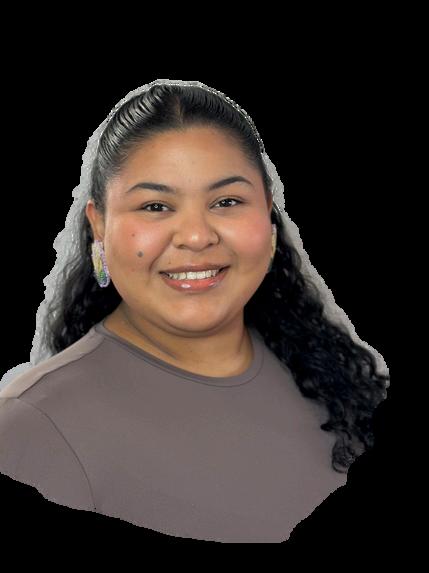


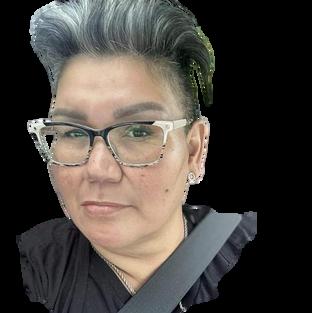

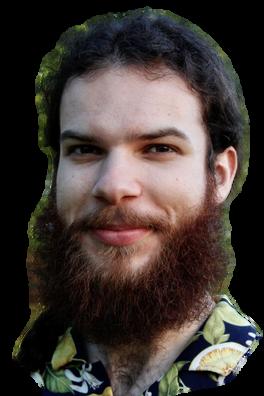

David, a Red River Métis language activist with roots in St Adolphe, PointeCoupée, and Neepawa, is studying Indigenous language pedagogy and linguistics at the University of Winnipeg.David is a passionate advocate for Southern Michif revitalization. After learning the language through a Mentorto-Apprentice program, he now teaches workshops and immersion classes to support language reclamation, using music and land-based approaches to foster cultural and community renewal David’s mission is to strengthen Métis identity and create sustainable pathways for future generations to learn and preserve their ancestral languages
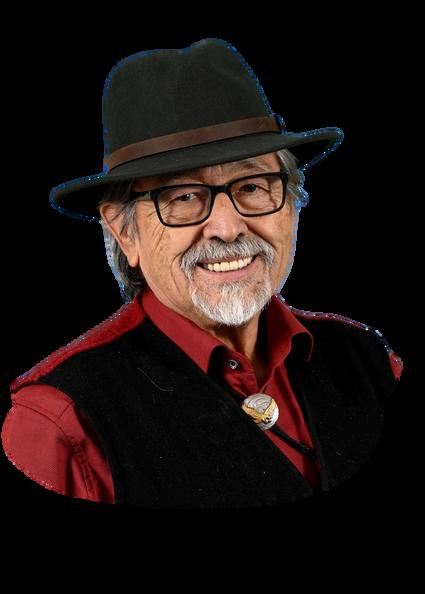
Stsmélqen, Ronald E Ignace, is a member of the Secwépemc Nation and Canada’s first-ever Indigenous Languages Commissioner He served as chief of the Skeetchestn Indian Band for more than 30 years. He also served as Chairman of the Shuswap Nation Tribal Council and president of its cultural society where he initiated a broad program of research and reclamation on Secwépemc language and culture, including an innovative university partnership with Simon Fraser University (SFU). He holds a B.A. and M.A. in Sociology from the University of British Columbia, and a PhD in Anthropology at SFU in 2008, with a dissertation on Secwépemc oral history His work includes co-authoring Secwépemc People, Land and Laws: Yerí7 re stsqeyskucw and other publications on Secwépemc history, language, and ethnobotany
From 2003-2005, he chaired the Ministerial Task Force on Aboriginal Languages and Cultures, and from 2016-2021, co-chaired the Assembly of First Nations’ Chiefs Committee on Languages, where he played an instrumental role in the development and passing of the Indigenous Languages Act, 2019. Raised by his great-grandparents, and despite being taken to Kamloops Indian Residential School, Ron is a fluent speaker of Secwepemctsín, with over 60 years of experience in Secwépemc traditional skills He and his wife, Dr Marianne Ignace, were awarded the Governor General’s Award for Innovation in 2019 for their collaborative research with Indigenous communities In 2024, Ron received the Indspire Award for Language for his leadership in Indigenous language revitalization.
Dylan is néhiyaw from Treaty 6 territory He’s been living in Montréal since 2021. Since graduating university in 2015, with a bachelor in Communication Studies, he’s written for various publications and worked for the government of Alberta and multiple NGOs, most recently, Native Montreal, as their Membership Services Coordinator. Dylan is proud to be contributing to the holistic health of Montreal’s Indigenous community and is dedicated to upholding Indigenous cultural values in the pursuit of a positive future for all.
Elaine pronouns Qwe/she/her. Tra biological mother from Amisk Lak Buffalo Narrows Sk. She is a me Northern Saskatchewan and is Wol returned home in 1996 She has be areas of child welfare, MMIW2SG, that include spaces for the LGB informed Counsellor, a Blanket exe spectrum birth to death Doula, Tra is the Cofounder of The Sixties S teachings.
Gabrielle is Kanyenke’hà:ka, tur Kahnawà:ke She attended the Sha in 2008 and has worked in diffe including immersion school teache earned her Master of Education de Education in 2018 from the Un currently finishing her PhD studi program. Gabrielle is a mother of time, Gabrielle likes to garden, kaya
Jenna is a proud Mi’kmaw woman Scotia. She is a passionate advo portability of rights, mental health studied Communications, Public professional background in prog mental health, and youth program workshops across the province in h

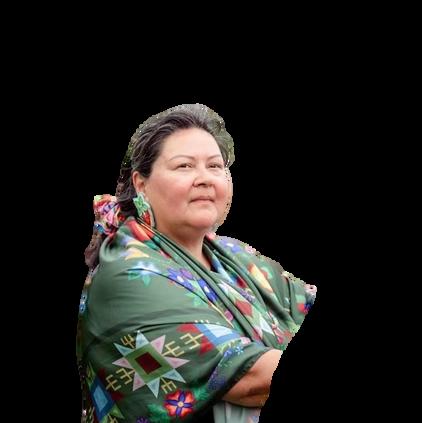
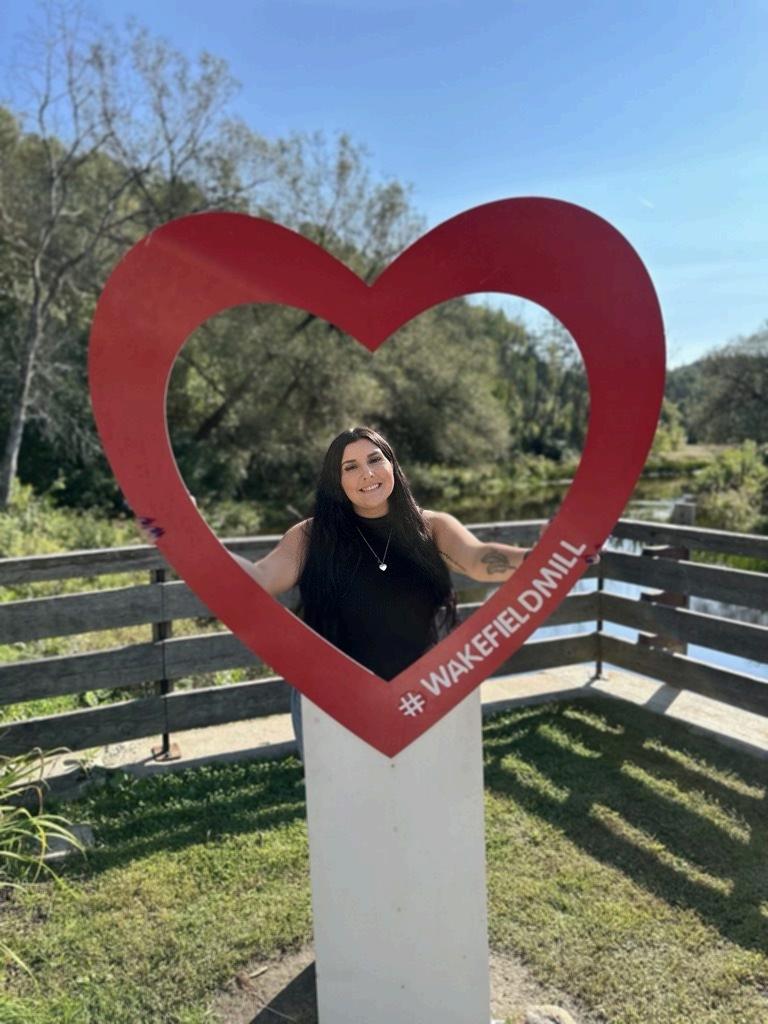

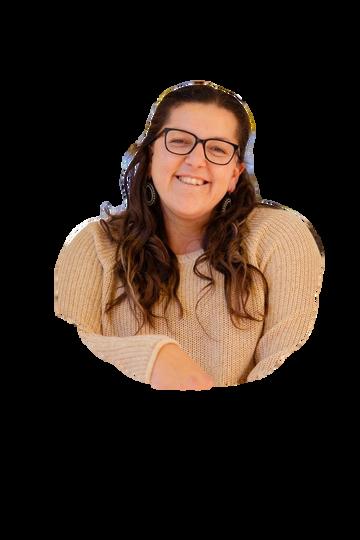
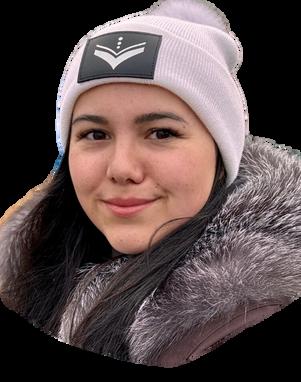
Julien is Red River Métis from Winnipeg, Manitoba, and shares French and Ukrainian ancestry. He is deeply committed to the revitalization of the Southern Michif language where his work in land-based programming provided him with the unique opportunity to teach workshops that integrated Michif language immersion and canoe programming. He has also participated in language immersion classes and helped run smaller workshops, furthering his abilities Julien’s commitment to his culture extends into music; he has been playing the fiddle for two years, complementing his dedication to cultural preservation and education In addition to his language work, Julien is studying Landscape and Urbanism at the University of Manitoba’s Faculty of Architecture, where he is a member of the Indigenous Design and Planning Student Association (IDPSA). Julien also collaborates with Waterways Canada, providing canoe and land-based programs for Indigenous youth across Manitoba.
Kelsey was born and raised off reserve with little contact to her Wəlastəkwey community of St. Mary’s First Nation. She is a proud Wəlastəkwewiskwehs who takes pride in her love for her culture and language. Kelsey is a daughter, a sister, a mother and a friend with 3 growing boys who are the light of her life. Kelsey received her diploma in Early Childhood Education in 2010 and received her Diploma in Maliseet Immersion in 2015 Kelsey leads the Skicinowato – Speak Maliseet Program at Under One Sky providing language education to all ages, including a Youth and Me program for parents and children
Laura is the program support for the Msɨt Mijua'ji'jk(All the Children) program at the Mi’kmaw Native Friendship Centre in Halifax She is a proud Inuk woman originally from Rankin Inlet, Nunavut Laura is a mother totwo young boys, a wife, and a dog mom She is passionate about helping parents and children reconnect with their culture and language.
Lisa Mercure (Mikisew Cree, K'ai Taile Dëne Sųłıné, Wêmistikôsêw Iskwêw) is the Indigenous Culture & Traditions Coordinator at the Victoria Native Friendship Centre (VNFC), where she supports Elders in determining culturally relevant programming for the urban Indigenous community at VNFC Lisa provides technical support to Elders engaging on advisories and supporting VNFC’s in-house programs With 19 years of experience in managing the Urban Indigenous Friendship Centre Program in BC, Lisa supports leadership training for governing boards and management. This mentoring model continues to inform her, in building consensus and mentoring emerging leaders.
A woman from Longueuil who made the big *moove* to La Tuque in 2021; a mother of 2, Marie-Lou has been working as a remedial teacher at the Centre since moving to the region She supports the Friendship Centre's employees in harmonizing practices and ensuring cultural relevance She also develops materials to help her colleagues in their daily activities
Melanie is Mi’kmaw First Nation from the community of Millbrook First Nation, from Nova Scotia, located in the traditional territory of Mi’kma’ki. After growing up and living in Millbrook until the age of 19 and achieving her diploma in Child and Youth Care from Nova Scotia Community College, she moved to the city of Halifax to pursue higher education in Child Studies at Mount Saint Vincent University. In 2019, Melanie w Youth Workshop Coordinator, where she coordinates various p and events for urban Indigenous youth Melanie sits on t Indigenous Youth Council as Atlantic Representative She has time with Elders, teachers, and youth, learning from their w guidance Her work is driven by her love and passion for the liv people, land-based and hands-on learning, culture, and leadership
An Opiticiwan woman, mother of 3, translator & cultural and hea consultant at the Capetciwotakanik Friendship Centre since Septe Nadia helps ensure that the Centre’s documents are properly tra she also develops culture and tradition-related materials for emplo
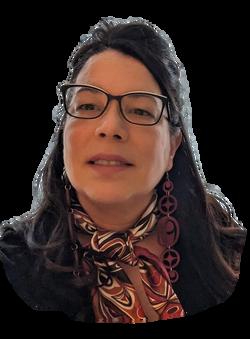
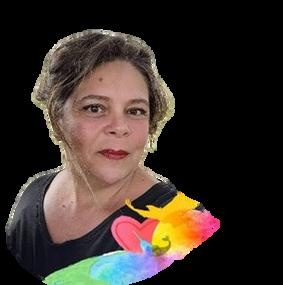
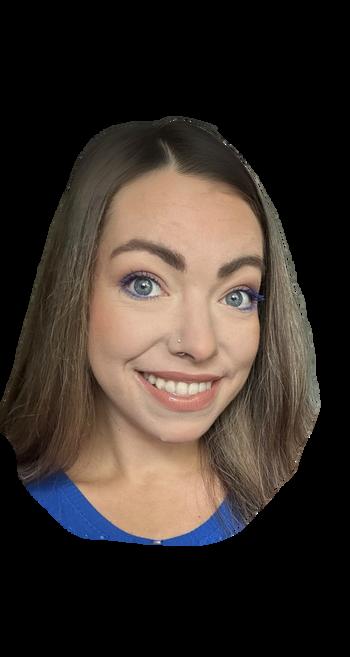


Paul Pelletier is the Assistant Deputy Minister (p i ) of the Community and Identity sector. He previously served as Director General of the Indigenous Languages Branch at Canadian Heritage and is Canada's representative on the Global Task Force for the International Decade of Indigenous Languages (2022-2032). Paul has over 23 years of experience in Indigenous policy and programs, focusing on building relationships with Indigenous partners, advancing policies on language, culture, education, healthcare, justice, and environmental management His work includes collaborating with Indigenous partners to implement the Indigenous Languages Act, advancing the Truth and Reconciliation Commission's Calls to Action, and respond to the National Inquiry into Murdered and Missing Indigenous Women and Girls Calls to Justice, and supporting initiatives like the Canada-Aboriginal Peoples Roundtables. Paul has held roles with Indigenous Services Canada, Health Canada, the Department of Justice, and the Privy Council Office. He holds a master’s degree in social work from Wilfrid Laurier University.
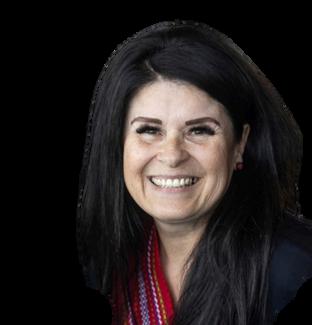


Rae-Anna is a member of Kitigan Zibi Anishnabeg First Nation, with strong ties to her mother's community of Neyaashiinigmiing Anishnabek First Nation. She is a Traditional Knowledge keeper, frontline activist, Women’s Traditional Dancer, Land Defender, Water Protector, and Water Ceremony Carrier Fluent in both French & English, she is also learning Anishnabemowin Raised in Ottawa, Rae-Anna has been actively involved in the local Indigenous community, volunteering with various organizations, and more recently taking up her responsibilities within Kitigan Zibi Following the guidance of her grandmother, a well-known respected Elder in Kitigan Zibi, Rae-Anna has taken on greater responsibilities as a Knowledge Keeper. She works closely with her teachers to care for her community and ensure the passing down of knowledge, a responsibility she holds deeply for both current and future generations of Anishnabeg.
Sandra, a proud Métis woman from Ile-a-la Crosse, Saskatchewan, is a retired teacher with 32 years of experience and a strong advocate for Indigenous language preservation, focusing on Northern Michif and Plains Cree ‘Y’ dialects She currently works as a Language Holder and Educator at the Edson Friendship Centre and as a Michif Language Consultant with Rupertsland Institute. Sandra is passionate about sharing her knowledge of language and culture, driven by her experiences with the multi-generational impacts of the Residential School system.
Sarah is Coast Salish from the WSÁNEĆ Nation near Victoria, BC. Sh been living in Tiohtià:ke (Montreal) since 2016. In 2023, Sarah graduated Concordia University with a Bachelor of Arts in First Peoples St Throughout her post-secondary journey, she has studied music, culinar Indigenous studies, as well as some psychology and political science S committed to strengthening Indigenous communities by supp Indigenous rights, identity, and culture Sarah plans to continue work whatever way she can to help build, uplift and empower our Indige communities.
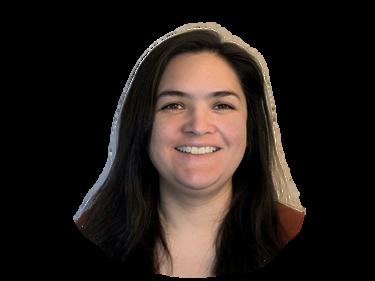
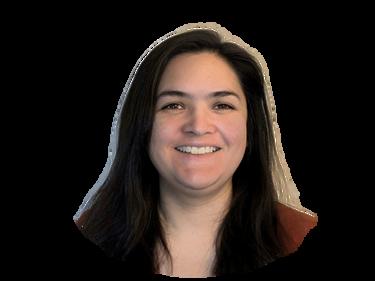
Senator Ray Fox is a Member of Sweetgrass First Nation in Saskatchewan He has devoted much of his life to bridging Indigenous and non-Indigenous cultures together whether through his work as a politician, a broadcaster, an executive, chairman, and board member For over 20 years, Ray has been an essential figure within the Friendship Centre Movement and is currently the NAFC Senator for Saskatchewan. The NAFC Senate is an integral part of the Friendship Centre Movement. Senators are individuals who are recognized for representing a set of core values which reflect the history and evolution o the Friendship Centre Movement. Senators may be called upon to provid information, guidance or advice to the Friendship Centre Movement from time-to-time
A community leader through and through, Ray has a long list of communit involvement with the following organizations: the United Way, Publi Complaints Commission of Saskatchewan, National Aborigina Communications Society, Battlefords Chamber of Commerce, Battleford Indian Métis Friendship Centre, Battlefords Urban Native Housin Corporation, Saskatchewan Association of School Councils, Prairi Employment Program, SaskCulture First Nations and Metis Advisory Circle RCMP Victims Services Personnel Committee and the Fort Battlefor Advisory Group
Ray has received many awards over the years including: the NACS (Nort American Culture Show) Broadcaster of the Year Award; Queen’s Golde Jubilee Medal (2002); Federation of Saskatchewan Indian Nations Citizen o the Year Award (2006), Battlefords Citizen of the Year Award (2008) and th Saskatchewan Volunteer Medal by Lt.-Gov. Vaughn Solomon Schofield.
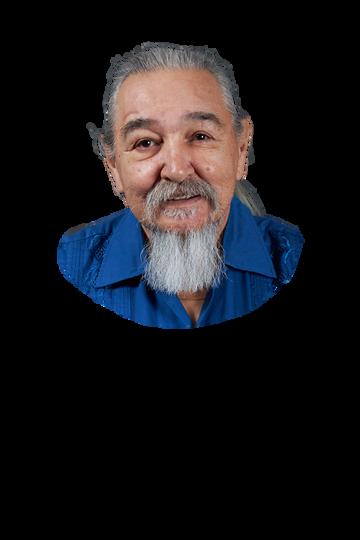


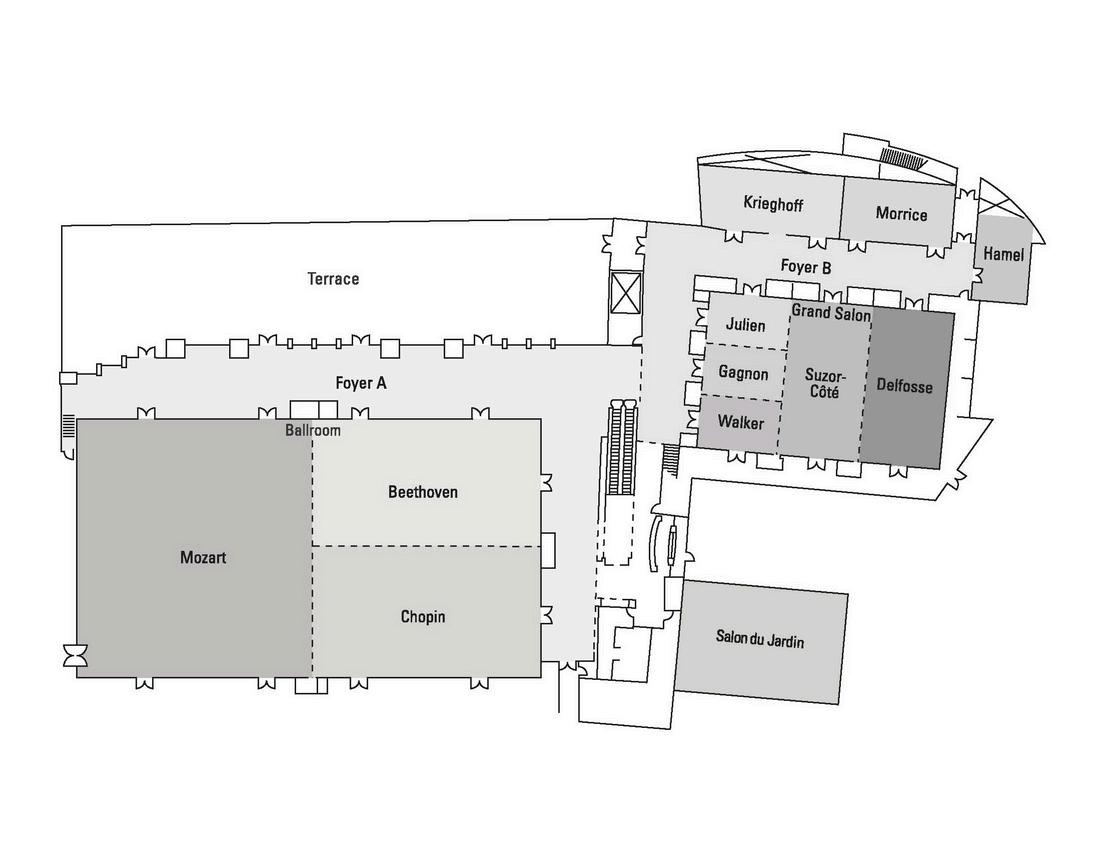

Funded by the Government of Canada | Financé par le gouvernement du Canada
